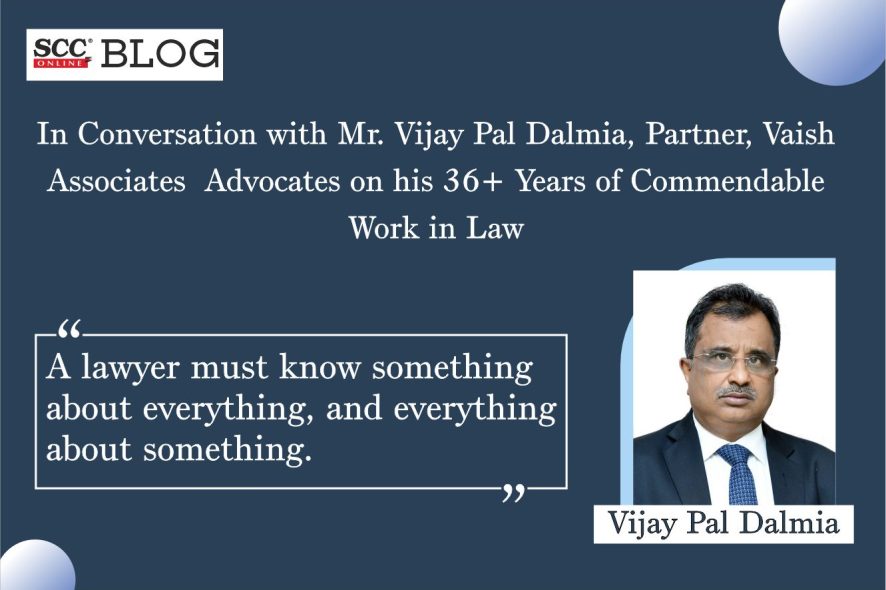Mr Vijay Pal Dalmia has been practicing as an advocate for the last 36 years, and registered with the Bar Council of Delhi. From 1986 to 2006, he independently practised before the Supreme Court of India, various High Courts, District Courts and Tribunals in India. Since April 2006, he has been associated with Vaish Associates Advocates, a leading law firm in India, and is presently their practice head in intellectual property, information technology and cyberlaw, commercial advisory and litigation, civil and criminal litigation, arbitration, sports, gaming and gambling laws, white collar crimes including anti-money laundering laws. He also advises clients on legal issues relating to blockchain and cryptocurrencies.
He has been interviewed by Madhumitha Ravindran, EBC/SCC Online Student Ambassador who is currently pursuing law from SLSH.
1. To begin this interview, please tell us a few words about yourself for our readers. Would you also like to share a fun fact about yourself?
It has been 36 years now in law practice, and I am fortunate to have handled a wide variety of cases before various legal forums. I am a true believer of the philosophy as a lawyer that “a lawyer must know something about everything, and everything about something”. Except in few types of cases, I have never said no to my clients, and have always tried to serve them to the best of my professional abilities. In this profession, I have learnt one thing i.e. you can not chase money, but money will follow you and it is a by-product of your services.
2. You have had a commendable 36+ years’ in the legal industry. What made you choose law and kickstart a career in law?
When I did my law in the year 1986, it was one of the options available out of very limited professional options. My father was a seasoned senior lawyer, and he was an inspiration for me to join this profession. Otherwise, also interaction with people and dynamism of law, always fascinated me.
3. There are various areas of law that you are specialised in. Which has been the most interesting, and which has been the most challenging for you till now? Please share any incident that you found particularly interesting or challenging.
Around the year 2000, internet was becoming popular and had started entering our lives. This part of law and its international dimensions which included cybercrimes, data theft, online privacy and widespread privacy attracted me towards cyber and technology laws. Later, in around, 2012, I started developing immense interest in cases relating to white collar crimes including cases relating to money laundering, benami transactions, income tax prosecutions, black money and foreign bank accounts, and I have been fortunate to represent clients in some of the prestigious cases in India.
4. Intellectual property rights or information technology law — which of the two do you think upcoming law students and lawyers should be more aware about?
My advice tilts towards information technology laws, as there are immense professional opportunities, and these laws everyday touches our lives. Now web 3 is coming. Things are getting decentralised. New types of agreements are taking place. Blockchain is becoming part of life. Please remember, blockchain is not cryptocurrency only. In any case, in the initial few years learn law, not any particular subject. Specialisation comes later.
5. Can you please share your experience working as counsel for the Government of NCT Delhi?
Experience was good. It was frustrating. Found lack of will on the part of the government officials to resolve the cases. Still, it gave me a vast experience in handling different type of cases, which was most satisfying.
6. A follow-up question: Can you please share your views as an advocate who has worked as an independent counsel, a government counsel, and a counsel for a law firm? How was the transition from one to the other?
The transition has been dynamic. Working in a law firm is an altogether different experience. In a law firm you act as a team, you have knowledge resources, and the knowhow. You also command instant support of professionals from different practice areas. Your research is better. Moreover, the clientele is also good and international in nature. Practising independently is always a different ball game.
7. You have been helping start-ups do business in compliant manner. What are some laws that start-ups should keep in mind before venturing into their business?
For any start-up there are two most important things. First, contracts and second is intellectual property rights. Start-ups should believe in writing, and nothing should be left to imagination. Trust is good but having things in writing is better. Whether anything relates to the partners in start-ups or with customers/suppliers, have elaborate agreements in place. Secondly, the start-up culture is greatly associated with IPRs. Start-ups must take special care to protect IPRs. The value of a start-up lies in its IPR.
8. Please share your opinions on the importance of legal research.
Indian legal interpretations, are ever dynamic. One can say nothing is final. Courts are evolving jurisprudence every day. One can never give a final opinion on any subject. So, one must make legal research a tool, which should be indispensable.
9. Finally, is there anything you would like to share with the readers of SCC Online?
Please share your knowledge which you acquire during the course of your studies and profession. Keep writing and write from a common man’s perspective. Let us make law easy.







